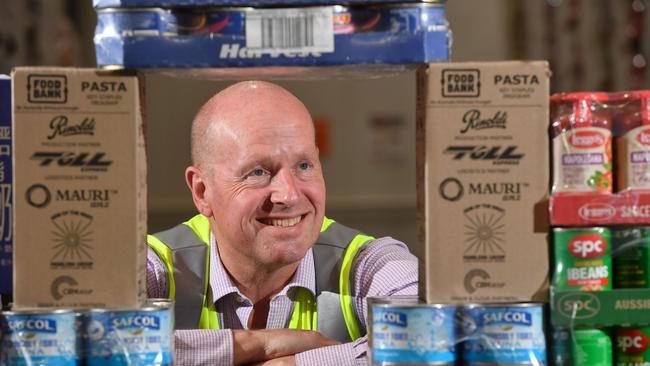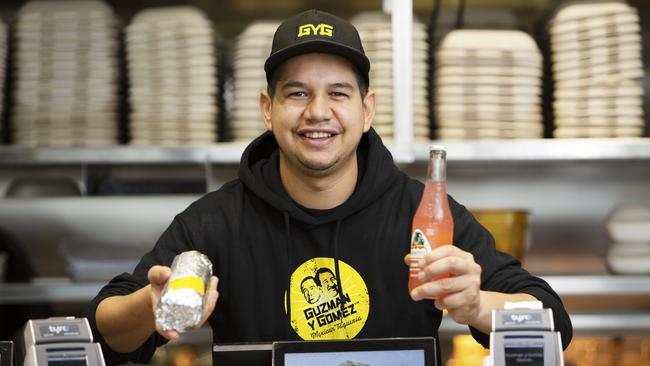Huge rise in uni students relying on food aid as COVID-19 job-losses bite
Even as the CEO of FoodbankSA spoke to The Advertiser, students came in to redeem vouchers for food as more lose their jobs and have no money to eat.
Tertiary
Don't miss out on the headlines from Tertiary. Followed categories will be added to My News.
The state’s leading food relief organisations are reporting a “substantial” increase in the number of university students – both international and local – it is helping to feed in the wake of COVID-19.
FoodbankSA CEO Greg Pattinson said prior to the global pandemic there were some students attending his organisation’s food hubs.
“However, we’ve seen a spike in the number of students now coming through to get food,” he said.
“We are seeing more international students than ever before and we are also seeing many local students who have lost their jobs and are grateful for the support.
“We need to provide food relief to ensure they don’t go hungry.”

While Mr Pattinson was on the phone to The Advertiser, three students arrived to redeem Foodbank vouchers.
He estimated overall demand for his organisation’s service had increased by 30 per cent in the past three months, tipping the situation could worsen as the cold weather sets in.
“In winter, demand always increases as the bills come in and, for many of our clients, it is a choice between ‘heat or eat. Access to our service means they can feed themselves and their families.”
Mr Pattinson said food packages were provided only to clients referred by government agencies or charities.
“We don’t ever judge or assess if someone needs help. Once an external agency tells us, ‘this person needs food’, we are here to help. If they are referred to us, they have been identified as in genuine need of food relief.
“We have seen a significant increase in the last few months, particularly referrals from key universities.”
Baptist Care SA has also seen a spike in demand, its CEO Graham Brown reporting a fourfold increase since COVID struck. And, of 450 emergency relief applications, more than 200 have been from international students.
“Our Emergency Relief team has been handing out high volumes of food parcels to people in need every day,” Mr Brown said.
“More recently, this has included hundreds of international students facing financial hardship brought on by COVID-19.
“A lot of these students came to Adelaide to study, expecting they would get part-time jobs. But, of course, a lot of the inner-city hospitality jobs are gone, so they’ve basically been stranded here with very little income.”
Persistence puts food on table
Several months ago, it seemed COVID-19 may have put an end to Miguel Reyes’s dream to complete a diploma in commercial cookery.
The Mexican national, in Australia on a student visa, was working at a cafe in Glenelg when he was laid off due to the global pandemic.
With only a couple of months left of his Queensford College course, he feared he would need to abandon it and head home. “I had some savings but still I had course fees to pay, as well as rent, and I was worried I wouldn’t get another job – I thought I may need to sell my car,” the 30-year-old said.
“I had many friends who had to leave behind their studies and head to their home country.”
Mr Reyes set about asking around for work and dropping his resume where he could.
He is now working for OTR at its Salisbury Downs Mexican-inspired takeaway franchise, Guzman y Gomez.

“To be honest, I thought it would take me longer to get a job but thankfully I got this one within a couple a months,” he said.
“My advice to others is not to give up and to look beyond what you are used to doing – look for other opportunities.”
OTR parent company, Peregrine Corporation is the state’s largest private employer, with more than 4300 staff.
Since March, it has hired 227 new employees across its business, both in OTR convenience stores and the head office.
OTR CEO Warren Wilmot said he was proud of the “tireless contribution” of staff throughout the COVID crisis.
“One of the most positive things we saw during the COVID-19 pandemic was our team’s measured response – we focused on safety, but didn’t overreact,” he said.
“It was also great to acknowledge our team members in store as the frontline essential workers that they are.”
Committee for Adelaide CEO Jodie van Deventer said international students formed a vital part of the modern fabric of SA.
“International education is South Australia’s number one export industry and international students not only bring enormous economic benefits, but add to the vibrancy of our city,” she said. Boomerang International Education’s Aashish Wagley agreed.
“The reality is that some (international students) rely completely on their part-time job for their living expenses and, without a job, it’s impossible for them,” she said.
“Students who are enrolled at small vocational education providers – and pay five to six times the fees of local students – do not have much support.”
